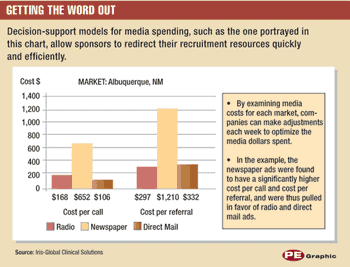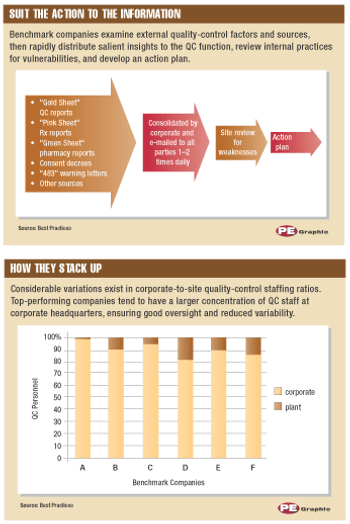
A powerful new tool is available to FDA through a first-of-its-kind cooperative research and development agreement (CRADA) between FDA and EduNeering, a developer of computer-based compliance training systems.

A powerful new tool is available to FDA through a first-of-its-kind cooperative research and development agreement (CRADA) between FDA and EduNeering, a developer of computer-based compliance training systems.

Contrary to popular belief, physicians still can't retrieve the full medical history of every patient who walks into their offices. Nor can they zap prescriptions through a clearinghouse that shows whether patients are eligible for coverage and reviews all medications they are taking to forestall drug?drug interactions.

According to many legislators and the media, pharma companies, abetted by Madison Avenue, lead the corporate villain list, just below auditors and errant CEOs.

Check out the ranking of the world's largest pharma companies in the fourth annual Pharm Exec 50.

Table of Contents

In the excellent online magazine The Edge (www.edge.org), Gerd Gigerenzer, director of the Center for Adaptive Behavior and Cognition at the Max Planck Institute for Human Development in Berlin, poses a riddle about risk: Imagine that a 40-year-old woman has her first mammogram and it comes back positive. The incidence of the disease in her age group is 1 percent. The test is 90 percent accurate, and it has a false-positive rate of 9 percent. What's the probability that the woman has cancer?

Advanstar Communications Inc. announced that its Pharmaceutical Executive magazine was awarded, for the second year in a row, the coveted Jesse H. Neal National Business Journalism Award for editorial excellence from the American Business Media (ABM).

Table of Contents

The pharmaceutical industry is experiencing unprecedented late-stage setbacks, product recalls, and difficulties in generating high-quality drug candidates. The problems are not specific to any one company or research effort but rather a result of the industry's limited knowledge of biology and chemistry.

When it comes to recruiting and enrolling individuals in clinical trials, the industry's challenge is similar to the one that General Riggs cites in his call to modernize the US Army.

The trick in understanding any contentious public debate is to figure out what's being left out of the discussion. What, for example, is the assumption that's so obvious that no one thinks to bring it up? More often than not, when you've located that assumption, you've found the secret core of the argument -- the part that everyone's really fighting over and no one can bear to mention.

As scientists' knowledge of biochemical pathways increases, so does the number of patents issued for generic treatment claims. Such claims represent methods of treating disease by modulating a particular protein in the body.

The competition for generics' 180-day marketing exclusivity is fierce, and Dr. Reddy's Laboratories filed the first court case calling into question FDA's methods for determining exclusivity on a patent-by-patent basis.

In hindsight, it seems Catherine Angell Sohn, PharmD, was destined to become vice-president, worldwide business development for GlaxoSmithKline Consumer Healthcare (GSKCH). Sohn, a former pharmacist, architect of three Rx blockbuster launches, and engineer of innumerable partnerships and licensing agreements, is a pivotal link between GSK's pharmaceuticals and consumer healthcare.

The ability to compete globally is essential to success in the pharmaceutical industry. The current trend is to establish joint ventures, outsource various stages of the development and production of a single pharma product, and purchase or start an indigenous business in other countries.

All is quiet at the Drug Information Association's new headquarters, a short ride from the hubbub of Philadelphia. But inside, the association buzzes with change as it harnesses the expertise and energy of its members to improve healthcare around the world. Now approaching its 40th year, DIA is expanding both its educational programs and its global reach.

Consider the following real-world scenario: Feb. 28-Apr. 14, 2000. Third-party auditors warn Schering-Plough (SP) of problems with product quality, including lack of quality control (QC) and high staff turnover. Dec. 20, 2000. SP's stock price reaches a high of $60 per share. Jan. 19, 2001. FDA completes an in-depth inspection of SP production facilities, identifying significant, repeated, and widespread QC violations dating to 1998. Several production lines are shut down and the Clarinex (desloratidine) launch is delayed.

As the popularity of online training grows, many pharma companies are likely to implement learning management systems (LMS) that can manage the reams of data generated by training divisions in a regulated environment.

Table of Contents

For the pharma industry, the year 2002 brought unprecedented competition, pricing pressures, public scrutiny, and ever-increasing regulation, all exacerbated by a weak economy. (See "Defining Events," pages 50-56.) Although a few companies forged new partnerships and produced life-saving treatments, many more struggled to meet the industry's challenges. And no road map exists to guide them through today's continuing market pressures or to help them anticipate tomorrow's challenges.

Eighty thousand pharmaceutical reps crowd US waiting rooms vying for the opportunity to see physicians. Meanwhile, managed care companies require contracted physicians to churn through a growing number of patient appointments each day. And regulatory forces have removed from the marketer's toolbox many effective tactics for gaining access to doctors outside their offices. With less physician face time available, stiffer competition for each moment, and tight restrictions on access, pharma marketers find themselves hamstrung in their efforts to move product and meet aggressive sales goals.

I received a letter recently from an AARP member in Carrolton, Kentucky, who wrote: ?Medicare will not help seniors with medicine costs. My husband?s a diabetic, has had two heart surgeries and asthma since childhood. He is 68 years old. I am 65 and have congestive heart failure and a lung disease. We have to spend so much on medicine, we barely live?can?t go anywhere except to the doctors and grocery. Please help people like us.?

Tne product still in naming, a potential Big Pharma partner, and a foothold field force in North America-those were the works in progress when we toured Eisai Co.'s headquarters and operations in Japan a few years ago.

Table of Contents

We all feast from the same kettle-and this season, we're not just feasting; we're swimming in a war-fired stew of events and issues.

The federal government's enforcement juggernaut rolls on-and the pharmaceutical industry is squarely within its sights. In recent years, the industry has paid close to a billion dollars in fines, civil settlements, and penalties.

Don't try this at home. That ought to be the common lesson we draw from most examples of pharma's current performance in the public arena.

Years ago, a cereal maker ran a commercial in which children who'd eaten oatmeal for breakfast floated to school, snug in a protective bubble of warmth. Today, the same imagery comes to mind with respect to the country's 85,000 pharmaceutical salespeople.

Fifty years ago, Watson and Crick changed the world by discovering the structure and function of DNA. Twenty-five years ago, Biogen opened its doors as one of the world's first global biotechnology companies. Thirteen years ago, James Mullen joined the company as director of facilities engineering and seven years later was promoted to international vice-president. Four years after that, in June, 2000, Biogen appointed Mullen president and CEO, and-in an uncanny continuation of its half-life evolution-named him chairman of the board after James Vincent vacated that seat midway through 2002.

New dynamics are forcing the industry's human resource departments to rethink their operational game plans. The drivers-consolidation, globalization, scientific advances, public policy, and competition-have pushed HR leaders into new territory to address business needs.